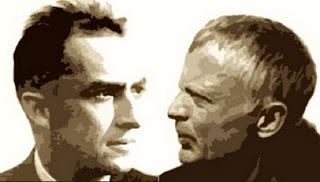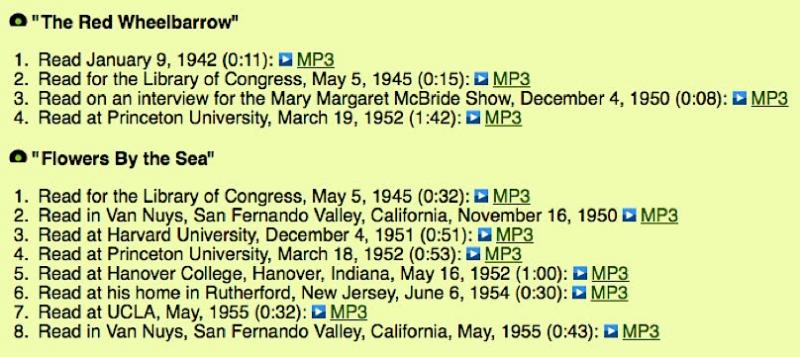
The poem is remembering me (PoemTalk #30)
William Carlos Williams
 Two tried-and-trues among the short poems of William Carlos Williams, as chosen for our 30th PoemTalk by Robert Grenier, who has been thinking about his WCW for many decades. First the metaphorical anti-metaphor of ocean and plant in “Flowers by the Sea”:
Two tried-and-trues among the short poems of William Carlos Williams, as chosen for our 30th PoemTalk by Robert Grenier, who has been thinking about his WCW for many decades. First the metaphorical anti-metaphor of ocean and plant in “Flowers by the Sea”:
When over the flowery, sharp pasture's
edge, unseen, the salt ocean
tied, released, seem hardly flowers alone
but color and the movement—or the shape
perhaps—of restlessness, whereas
the sea is circled and sways
peacefully upon its plantlike stem
And then, seemingly quite different but just as classic an instance of early modern condensation, “so much depends” (“The Red Wheelbarrow”):
so much depends
upon
a red wheel
barrow
glazed with rain
water
beside the white
chickens.
Charles Bernstein and Bob Perelman (Grenier once taught the latter poet at Berkeley, by the way) joined Al Filreis to speak with Robert Grenier about why and how he is always in the act of remembering these poems – or, as he puts it near the start of our talk, how the poems are remembering him. “Those words return,” says Grenier.
Al asks Bob P. and Charles to comment on the poetic relationship(s) between Grenier and Williams. Bob P. remembers Bob G. on Williams as fundamentally as Bob G. remembers his WCW. Grenier has always dwelled on the short vowel sounds emanating outward from “chickens.” It’s about farming and the social aesthetic and other big topics, but it’s also, says Bob P., about the patterning of words’ sounds. This was what Grenier had already taught us, years ago.
The group, prompted by Al, discusses the autotelism of “Flowers by the Sea,” and, for Charles, both poems have a “specific autonomy.” When Charles admiringly isolates the line “edge, unseen, the salt ocean,” he is put in mind of a Larry Eigner and of a possible lineage running through WCW to Eigner. He is implying there a place for Robert Grenier in that line, of course, since Grenier, at the time this session was recorded, was just then anticipating the publication of his four-volume edition of Eigner’s poems.
We discuss what WCW meant when he said of the more famous of our two poems that it was “the same as a thing of beauty.” The red wheelbarrow as locating a rewriting of Keats’ “Endymion”! “It an injunction,” says Grenier, “to pay attention to something because of its moral value. And it directs you to what is in the fact an image, in itself, as an image…. Words being composed as letters, as a composition of successive shapes. It only happens because of the conjured quality of the form.”
The Williams PennSound page features every known recording made of the poet reading and talking. Scroll to the bottom of the page and see, gathered together, links to all the readings of several of the WCW chestnuts: “This Is Just to Say,” “Between Walls” (the topic of the very first PoemTalk show), “To Elsie,” and PoemTalk 30’s twosome.
The recordings of William Carlos Williams on PennSound were compiled at Keele University, England, by Dr. Richard Swigg, based on work originally done in 1992 and 1993. PennSound gratefully acknowledges the scholarship and editing of Dr. Swigg in making this Williams sound archive available, and also the estates of the sons of William Carlos Williams, and Peggy Fox at New Directions, for giving PennSound permission to make the recorded poetry of Williams downloadable and free to all. The PennSound Williams page is one of the most oft-visited web pages devoted to poetry anywhere in the world.
Our engineer for this episode of PoemTalk was James LaMarre and our editor is Steve McLaughlin. We’re on a Grenierian roll and next time on PoemTalk, episode 31, you’ll be invited to hear Jena Osman, Joseph Yearous-Algozin and Bob Perelman talk with Al about the famous Sentences project, five hundred poem-cards stacked in undetermined order inside a home-made box.